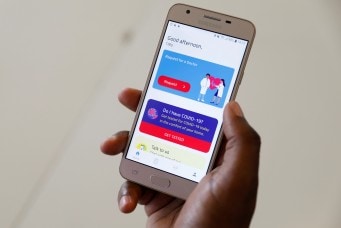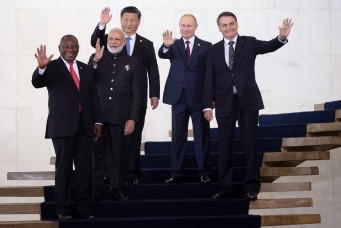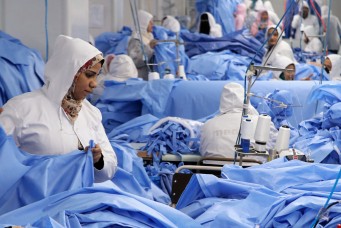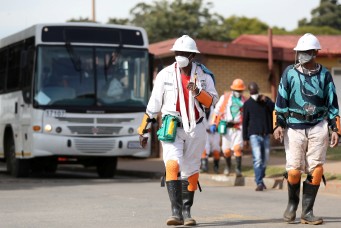COVID-19 Impact on Africa Elections
The pandemic is forcing African states to choose between holding elections on time and postponing them for safety. The risks run both ways.
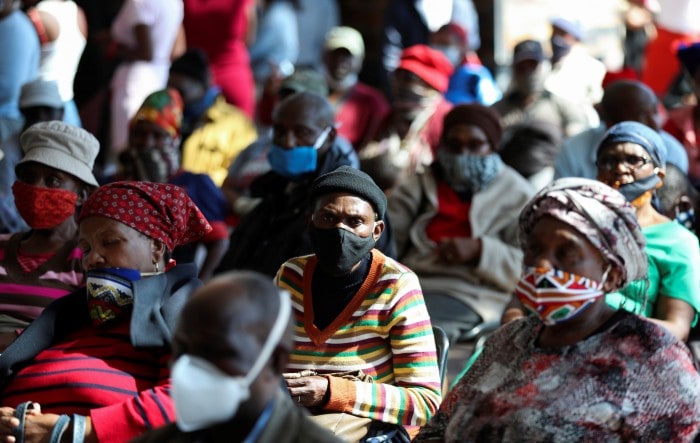
Men and women sit in a queue waiting for government grants as South Africa starts to relax some aspects of a stringent nationwide coronavirus disease (COVID-19) lockdown in Soweto, South Africa, May 4, 2020. Siphiwe Sibeko/Reuters
The D.J. on stage announces to an electrified crowd the arrival of the long-awaited opposition leader and candidate to the presidential election. “Thanks to your support and your vote, we will rule together this country. Give me the power and I’ll give it back to you” he says, concluding his remarkable speech.
This (fictitious) scene sounds like déjà vu for regular attendees of political rallies. Every four, five or seven years, African citizens across the continent are called upon to cast their ballots, the highest symbol of a democratic system. Through it, they assert control over their destinies, rewarding and punishing those in power like a teacher grading his students’ papers. In this time of uncertainty, with the outbreak of the Covid-19 pandemic disrupting our daily routines, scenes like this one, and the voting that follows, may not take place.
While the pace of medical research seems too slow at the moment, and hopes of getting a vaccine out quickly have diminished, the toll of the pandemic in Africa is climbing. That said, the continent has been less affected than others, with 23,254 cases confirmed in the World Health Organization (WHO)’s Africa Region as of 29 April. That assessment excludes some countries, however, and other sources suggest the number for the entire continent may be closer to 36,000. African states imposed containment measures including temporary lockdowns (in South Africa and Morocco), curfews in Western Africa and the rest of the continent, as well as border closures, prohibition against gathering and social distancing. In this environment, traditional elements of democracy are on hold with parliament sessions adjourned, and political leaders ruling by special decrees.
Leaders are now facing a Cornelian dilemma: to organize elections and raise the risk of spreading the pandemic, or to postpone the election and face accusations of authoritarianism. It is like choosing between two important rights, now in a situation of obvious conflict. Some countries have already made the choice, like Ethiopia where the electoral commission postponed the August general election. In Nigeria, Tunisia, Zimbabwe, South Africa, Gambia and Kenya several local elections have been postponed as well.
In Western Africa, countries are contemplating this scenario. On 15 April 2020, the national electoral commissions of the Economic Community Of West African States (ECOWAS) held a video-conference to discuss the feasibility of presidential elections in their respective countries. The press release of the conference reads as follows “[…] depending on the spread of the pandemic and its impact on the electoral commission timeframe, [ECOWAS] countries will consider maintaining or postponing those elections”.
This is not a decision to take lightly as the stakes are high, particularly where political systems and economies are fragile. In Côte-d’Ivoire for example, the environment is politically charged. Recently a high-ranking member of an opposition party accused Prime Minister Amadou Gon Coulibaly of an illegal campaign ploy—putting pictures of himself on food packages provided to families severely affected by the pandemic. In Somalia, opposition leaders insist on not using the pandemic as an excuse to postpone the 2021 election. In Uganda, the High Court has been called upon to rule on a citizen’s petition to postpone the 2021 election until further notice. The applicant asked for a five-year suspension.
Thus far, we’ve seen some countries go ahead with scheduled elections, and others pump the brakes on fall/winter voting. There are, of course, pros and cons to each, discussed below. Measures should be taken to ensure voting is as safe as possible, or in the case of postponement, that the democratic legitimacy of the state is bolstered until elections can be rescheduled.
The Primacy of the right to vote
At least two African countries made the risky decision to hold elections in the midst of COVID-19. In Mali for example, twice-delayed legislative elections finally took place on 29 March 2020, despite a declared state of health emergency, the kidnapping of the opposition party’s leader several days prior, and nine confirmed COVID-19 cases on voting day. Earlier that week, President Ibrahim Boubacar Keïta declared in an address to the nation that “[t]hese parliamentary elections resulted from the decisions of the National Dialogue, which set deadlines”, which were impossible to extend. The second round of legislative elections took place on 19 April 2020. So far no COVID-19 cases related to people coming out to vote have been reported.
In Guinea, voters headed to polling stations on 22 March 2020 for dual legislative and constitution reform elections, which were boycotted by civil society and the opposition. The same is true for South Korea—a country initially identified as a hotspot for COVID-19 that nevertheless fought to curb the spread of the pandemic and held its election. What shall we learn from these case studies?
We suggest that countries which are in the ultimate stages of the electoral process—i.e. voter registration, updating voter rolls, and campaigning—should maintain the initial dates of their elections if at all possible, after a critical assessment of how impacted they are by the pandemic. The United States’ Center for Disease Control and Prevention (CDC) has released some guidelines for holding elections safely during COVID-19. While some of these recommendations are U.S.-centered, like electronic and mail-in voting, which are difficult to implement in an African context due logistical and technological constraints, they do provide some key takeaways.
The guidelines suggest precautionary measures like equipping polling stations with hand-sanitizer, observing social distancing, mandatory wearing of face masks and gloves, and extending voting periods to eliminate crowding. Reports from the recent elections in Mali and South Korea suggest that these measures were observed. In South Korea, in addition to these measures, voters’ temperature was systematically checked before entering polling stations. These examples prove that organizing elections is possible. However in this time when caution is key, there are sufficient grounds to suggest that health and safety should prevail over the right to vote.
Preserving Health Over Civil Rights
The current situation provides numerous reasons for states to consider postponing upcoming elections. Indeed elections require several steps whose completion determine their credibility, and not all of these are currently feasible.
Voter registration
Voters need to be registered. In some countries the process of registration has either been suspended or registration has come in below initial expectations. The Ghanaian Electoral Commission decided to postpone indefinitely registering voters for the December 2020 General Elections. In its western neighbor Côte-d’Ivoire, while the process of registering people for the new biometric identity cards necessary to vote is still ongoing, it is far slower than expected. According to a high-ranking member of an opposition party, out of the 6,370,000 registered voters targeted, only 130,000 had registered as of this writing. Filling the gap before the October 2020 election appears a daunting task. With this in mind, some opposition leaders have voiced their concerns and recommended that registration be stopped. Low registration is attributable to several factors unrelated to Covid-19, but the fact remains that holding elections as scheduled, with so few citizens registered, would call into question the credibility of those elections.
Political campaigns
With public gatherings of more than 50 or 100 people prohibited in most countries on the continent, campaigning for elections is quite difficult. One may suggest online campaigning, but if not sufficiently controlled and monitored by states, this can open the door to hate speech and fake news (under the cover of free-speech). Campaigning also requires funding, mostly from states, which are currently directing all efforts and financial resources toward the prevention and mitigation of the pandemic.
International observation
If the Covid-19 situation does not improve, and borders remain closed, the absence of impartial observers from election monitoring organizations will cast doubt on the credibility of elections and potentially make the whole process worthless. Finally the citizens might be less likely to discuss politics in this time of uncertainty. Postponing or deferring elections is not free from consequences in the specific African context, it establishes a situation of democratic illegitimacy which we believe may be addressed if inclusive, consensual and transitional model of governance is adopted.
Governing in illegitimate capacity
In most countries, constitutions allow the incumbent head of state to remain in power after the expiry of his/her term until the organization of future elections under emergency circumstances (like the current one). This extraordinary situation puts the head of state in a situation of democratic illegitimacy. In this context the best course of action is to appoint a consensus government that collaborates with civil society actors and other stakeholders to govern in the interim. This scenario could work in Ethiopia where opposition leaders expressed interest in being consulted for an interim government after the postponement of general elections. In other countries it may not work, however. The prime minister of Côte-d’Ivoire, when questioned at a press conference about the likelihood of October elections being postponed and the option of a transitional government, dismissed them, saying that Article 59 of the constitution allows the president to remain in power until the next elections (whenever they may be).
Eligible to be classified as an “Act of God”—or an event impossible to foresee—COVID-19 is testing African countries in this particular year of general elections around the continent. We hope leaders in consultation with the relevant stakeholders in their states will strike the right balance, preserving safety and health, while showcasing their democratic maturity.
Arnaud OULEPO is a Research Associate at the Centre of Research for International Cooperation and Development at University Cadi Ayyad. Former intern at a World Bank Group Institution, he regularly comments on African politics, economics and development issues.
Read MoreSubscribe to Our Newsletter

